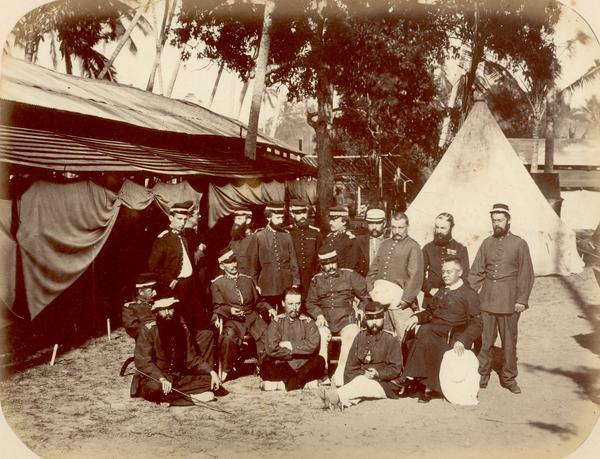Monique Ligtenberg
Curating Colonial Nature: Legacies of Empire in Swiss Natural History Collections, 1870s-1950s
This project investigates the colonial history of natural history collections and their collectors at the Swiss Federal Institute of Technology (ETHZ), the largest and internationally most renowned educational institution for science and technology in Switzerland. While the role of plant, animal and rock specimens in colonial exploration and exploration have fallen under increased historiographical scrutiny in ‘traditional’ imperial metropoles such as Britain, Portugal, or the Netherlands, natural history ‘made in Switzerland’ – never a formal colonial power itself – has barely been systematically studied in its global, historical context so far. As an overarching aim, the project hence unearths the hitherto unexplored connection between the establishment of geological, botanical, zoological, entomological or pharmaceutical university collections in Switzerland and the imperial conquest of Asia, Africa and the Americas from the age of ‘high imperialism’ to the early days of decolonization.
First, the study reconstructs the various institutional, interpersonal, and logistical networks that facilitated the exchange of natural history specimens between the colonies and Switzerland. Adopting a multifaceted approach, it investigates the exchange of specimens between ETH Zurich and colonial research institutions during the Age of Empire, delves into individual researchers’ colonial collecting expeditions, and assesses how the burgeoning global market for plant and animal specimens fueled the rapid growth of academic natural history collections, including those at ETH.
Second, the project investigates the extent to which individual Swiss botanists, zoologists, entomologists, or geologists benefitted from the infrastructures and asymmetric rule established by neighboring European countries in forging their research career and shaping their scholarly interests. On the one hand, it asks how colonial research expeditions and the acquisition of from a European perspective previously unknown natural history specimens could serve as a valuable means in claiming scientific authority. On the other hand, it highlights the ways in which Swiss scientists not only benefitted from the labor and expertise of local populations in the colonies, but also how indigenous Asian, African, and American experts and epistemologies shaped Swiss perceptions of nature.
Relatedly, a third focus of the project is on the ‘backflows’ of empire, specifically examining how the global entanglements of Swiss naturalists influenced the construction of knowledge on colonized natures, peoples, and environments in Switzerland itself. For this purpose, the study investigates how perceptions of nature emerging from colonial expeditions and encounters were reflected in the academic curricula at ETH, in what contexts natural history specimens from the colonies were incorporated into teaching and research, and to what extent this knowledge was disseminated among a broader, Swiss audience through popular publications or public lectures.
In alignment with the global framework and topical relevance of the project, several public history and outreach activities are planned. These include the development of novel teaching formats and the creation of new blogs and podcasts in close collaboration with the ETH Collections and Archives. In the long term, the data collected in the course of the project will be made accessible on a global scale through a specialized database, established in partnership with NAHIMA – Natural Science Collections Online, that documents and maps the provenance of ETH’s natural history collections from colonial contexts. The database aims to initiate a global discussion on the various (and potentially diverging) present-day meanings ascribed to natural history collections and to identify strategies for overcoming existing asymmetries in access to plant, animal and rock specimens.
Previous Project:

Medicine, Masculinities, and Colonial Knowledge: Transimperial Histories of German-speaking Physicians in the Dutch East Indies (c. 1873-1914)
German-speakers were the largest group of non-Dutch European physicians in the Dutch East Indies (today’s Indonesia) in the 19th century. More than 300 German, Swiss and Austro-Hungarian medical practitioners worked for the Dutch colonial health service in the 19th century, the majority of them joining the medical corps of the Dutch Colonial Army (KNIL), others serving in the comparatively small colonial civil health service. While some travelled ‘Far East’ out of unemployment or a desire for adventure, many were driven by scientific curiosity and contributed to a growing corpus of scientific literature on the colonized Malay Archipelago during or after their stay in the colony.
This PhD project investigates these historical entanglements between German-speaking Europe, the Netherlands and the Dutch East Indies in the late 19th and the early 20th century that so far have been overlooked by nation-centred narratives in historiography. Zooming in and out between micro-historical case studies and larger developments in the age of ‘high imperialism’, it will open up three fields of investigation: First, it will analyse the self-perception and identity formation of German-speaking physicians as male, non-Dutch, middle-class co-producers of medical, botanical, zoological, and anthropological knowledge with a special focus on the relation between imperialism, knowledge, and masculinity. Second, it will ask about the interaction between European and non-European actors, environments and knowledge cultures in processes of knowledge-making between germanophone Europe, the Netherlands, and the Dutch East Indies. Third, it will take a closer look at the transimperial networks that connected these spaces in order to further illuminate the ‘webbed’ character of colonial knowledge production and imperial culture that often transcended (trans-)national or intra-imperial boundaries.
Through the analysis of printed publications and archival sources from Swiss, German, Austrian, Dutch and Indonesian archives, the research project seeks to stress the hybrid and entangled nature of Dutch imperialism in the Malay Archipelago and the repercussions of these entanglements on a broader European ‘imperial world’. Thereby, it contributes to the up-and-coming strand of research in global history that understands colonialism not as a project of individual nation states, but rather as a product of both formal and informal networks, connecting the histories of colonial metropoles like the Netherlands, of nation states without formal colonies like Switzerland and of colonized Southeast Asia.